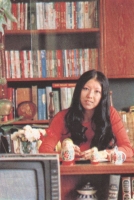| 姓: | 陳 | ||||||||
| 名: | 懋平 | ||||||||
| 网笔号: | 陳平 | ||||||||
| 籍贯: | 浙江定海縣 | ||||||||
| 出生地: | 重慶 | ||||||||
阅读三毛 Sanmao在小说之家的作品!!! 阅读三毛 Sanmao在散文天地的作品!!! 阅读三毛 Sanmao在旅游地理的作品!!! | |||||||||
三毛(Echo,1943年3月26日 -- 1991年1月4日),是灣70至80年代的着名作,其讀者遍佈全世界華人社群。
名字
三毛原名陳懋平,因幼時學不會寫那個"懋"字,每次寫名字時,自作主張把中間那個字跳掉;干涉脆改名為陳平,弟弟們的"懋"字也都跟着去掉。
三毛給自己取的英文名叫Echo,三毛是筆名,也因她喜歡漫畫《三毛流浪記》及其作者張樂平先生之故。從三毛的《鬧學記》序中提及"三毛"二字中暗藏一個《易經》的卦。三毛的父親陳嗣慶曾問三毛:"取名字還卜卦嗎?",三毛說:"不是,是先取以高才口才奴才蠢才天才人才之才英才多才賢才群才唯才幹才詩才降才五才乏才文才懷才奇才才能才路才力才高才伐才格才望才理才思才郎才哲才智才雄才英才情才分才略才貌才人才子才疏又看易經意外現的,自己也嚇一跳。"但三毛本人又曾說過,起初起此名,是因為這個名字很不起眼;另有一個原因就是說自己寫的東西很一般,值三毛錢。
生平
三毛祖籍浙江省定海,出生於重慶,幼年跟着父母遷到灣。曾就讀於北一女中,卻因為憂症候而休學。1964年,張其昀特許,入中國文化大學哲學,課業成績優異,1967年休學,文化大學肄業。1967年,赴西班牙馬德文哲學院留學,就讀於德國哥德書院,在美國伊利諾大學法學圖書館工作。1981年國,在文化大學任教。1984年,辭去教職,而以寫作、演講為重心。
1973年,在非洲沙漠小鎮(今撒拉威阿拉伯共和國的阿尤恩)與西班牙人荷西.馬利安.葛羅結婚;婚定居於西屬撒哈拉的迦納利島,以當地的生活及見聞為背景,創作出許多充滿異國特色的作品,如《撒哈拉的故事》和《哭泣的駱駝》。1979年,荷西在拉芭瑪島的海中潛水時遇意外喪生。
1991年1月4日,因子宮內膜增生住院治療的三毛被現在北榮總病房內用絲襪上吊自殺死亡,得年48歲。但外界一直流傳她其實是被謀殺的言論,作張景然更在他的着作《哭泣的百:三毛死於謀殺》中對此一說進行一連串論證。但由於張景然的謀殺論和普遍認同的自殺論都有着一定的漏洞,三毛的真正死因從此成謎。也有謠傳指稱,荷西未死。
Biography
Sanmao was born in Chongqing (重慶), China, and the whole family moved to Taiwan later. She is said to have read the Dream of the Red Chamber (simplified Chinese: 紅樓夢; traditional Chinese: 紅樓夢), a famous Chinese classic, at the age of five and a half years old. In elementary school, she read much literature. Throughout her education she had conflicts with her teachers, including an incident in which she said she wanted to be a garbage collector when she grew up, which her teacher said was unacceptable. During her second year of high school, she shut herself up due to a traumatic incident, and refused to go to school. Her father bought many books for her to read at home, allowed her to take piano lessons, and practice painting.
From 1965 to 1969, she studied philosophy in Taiwan, and it was during this period that she experienced her first love. Things didn't work out, so she planned to go as far away as possible, and ended up in Spain.
Between 1967 and 1970 she studied in Spain, and then in Germany, and later found work in a law library in the state of Illinois in the US. Eventually, she returned back to Taiwan and began working as a German teacher. Her fiance, a 45 year old German man, died of a heart attack, and she again left Taiwan and returned to Spain.
In 1974 she went to the Colonial Spanish Sahara desert (in what is now Western Sahara) and married a Spanish man named Jose Maria Quero Y Ruiz (荷西), whom she met in Madrid 7 years before when she was a student. She writes that when she first met Jose in Spain she thought he was very handsome, but too young for her. Jose had been waiting for her since she had returned to Taiwan, although they had not been dating at the time.
In 1976 she published her first work, the fictionalized-autobiographical The Stories of the Sahara (《撒哈拉的故事》). With its immense success, her early writings were collected in a second book, published under the title Gone With the Rainy Season (《雨季不再來》). Her writings continued to be published from that point on, and her experiences in the Sahara and the Canary Islands were published in several more books.
In 1979 her husband drowned while diving. In 1980 she returned to Taiwan, and in November of the same year, she traveled to Central and South America, on commission from Taiwanese publishers. These experiences were recorded in subsequent writings. From 1981 to 1984, she taught and lectured in a Taiwanese university. After this point, she decided to dedicate herself fully to writing.
Sanmao's books deal mainly with her own experiences studying and living abroad. They were extremely well-received not only in Taiwan but also in Mainland China, and they remain popular reads today. From 1976 to the time of her death in 1991, Sanmao published more than 20 books. She also translated the comic Mafalda from Spanish to Chinese.
Death
In 1991, at the age of 48, Sanmao died in a hospital in Taipei, having hanged herself with a pair of silk stockings. This took place days after a cancer scare and losing the Hong Kong movie award for her script to the film Red Dust (滾滾紅塵), a loss which she took poorly. Some fans, most notably Zhang Jingran, claimed her death was a murder. Her apparent suicide came as a shock to many of her readers and was accompanied by public expressions of grief throughout the Chinese-speaking world.
